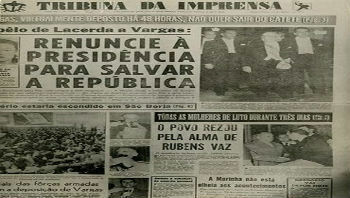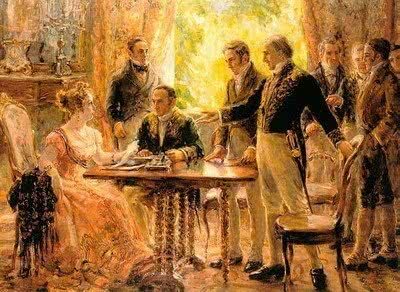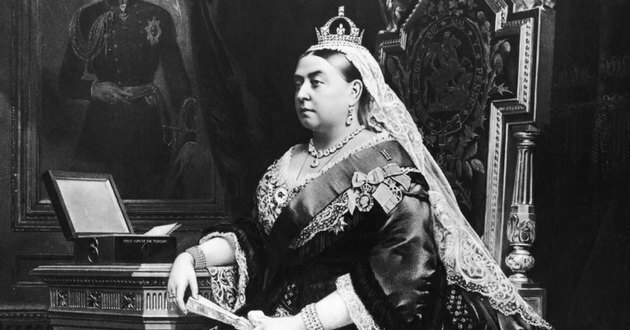Richard Nixon he was the 37th American president from 1969-1974.
His government was marked by the end of the Vietnam War, diplomatic rapprochement with China and the Watergate scandal, which forced his resignation from the presidency.
Biography
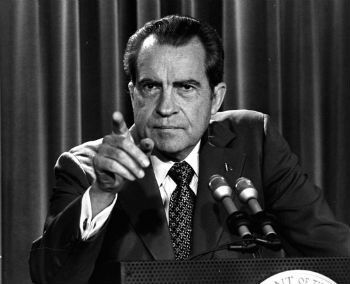
Richard Nixon during a press conference.
Richard Milhous Nixon was born on January 9, 1913, in the state of California. He graduated in law and worked for the federal government for two years. After World War II, he entered politics through the Republican Party and was elected deputy and later senator.
During his university studies, he joined an amateur theater group and there he met his future wife, Par Ryan. They married in 1940 and would have two daughters with her.
Nixon gained national prominence when he was responsible for the investigation of Alger Hiss, an American official accused of being a spy for the Soviet Union. In the middle of the Cold War, Nixon was inflexible and staunch anti-Communist. While pleading not guilty, Hiss was sentenced to five years in prison.
In 1952 he was chosen to be vice president on the ticket that would give Eisenhower the victory.
At the end of his term, he managed to impose his nomination as the presidential candidate of the Republican Party. Your opponent would be the Democrat John Kennedy and both staged the first televised debate in American electoral history.
Defeated by Kennedy, Nixon would run for election again in 1968 when he would win. Despite the Watergate case having sprung up towards the end of his term, he would still be re-elected for another four years.
Faced with the willingness of the US Supreme Court to open impeachment proceedings, Nixon resigned from his position on August 8, 1974.
He withdrew from public life and died April 22, 1994.
See more about: Watergate case.
Historical context
In the 1960s, the world was undergoing social and political transformations. The Cold War had reached its height with the Cuban Missile Crisis and the construction of the Berlin Wall. Against this environment of violence and tension, protest movements such as hippes, beatniks, rock, grow and spread around the world.
Likewise, the United States sustained an endless conflict in Vietnam, where American citizens questioned the validity of such a costly war.
Read more about Vietnam War.
Government
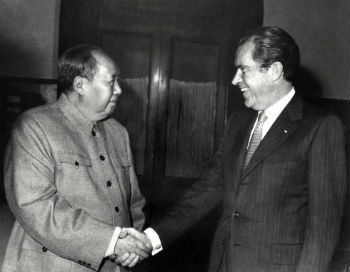
Mao Tse-Tung and Richard Nixon meet during the American president's visit to Beijing, 1972.
Richard Nixon's government was marked at home by a series of changes. Nixon created the first agencies that protected the environment, gave 18-year-olds the right to vote and could see Louis Armstrong walking on the moon.
Despite this, protests against the war in Vietnam continued and Nixon's main campaign banner had been to end the Vietnam War.
Thus, it seeks to get closer to China, in order to achieve an alliance that would not compromise the balance game between communists and capitalists in Asia.
He then undertakes a historic trip to Beijing in 1972, where he gets the support of the government of Mao Tse-Tung to open up Sino-US relations.
The end of the war was announced in 1973, but the definitive ceasefire would only come two years later. For all Hollywood's cinematic message, the fact is that the Americans lost the war and failed to prevent Vietnam from becoming a socialist nation.
The Nixon government would also intervene directly or indirectly in several coups d'etat in Latin America. The most notorious case was the deposition of Salvador Allende, in Chile.
Watergate case
The Watergate Affair was a political episode of corruption that took place in the 1970s and culminated in the resignation of President Nixon.
On June 18, 1972, the electoral committee of the Democratic Party, located in the Watergate residential complex, was invaded by five men. newspaper reporters Washington Post, Bob Woodward and Carl Bernstein, decide to investigate in depth what was being treated by the American press as a simple robbery.
Following the instructions of an anonymous informant - who would be nicknamed Deep Throat – the two journalists end up uncovering what would be the biggest scandal of American corruption. One of the intruders was an FBI agent. Likewise, they discovered that this agency and the CIA would have helped to plan the incursion.
The worst was to come when it became known that these people were linked to Nixon. Even the president himself would be aware that the invasion of the office of the rival party had taken place. An investigation was opened by the US Senate, and Nixon later refused to hand over evidence to the US Supreme Court.
In light of this, Nixon was asked to testify. As this would amount to a confession of guilt and the opening of an impeachment process, the American president preferred to resign. Next, Vice President Gerald Ford takes over, granting Nixon amnesty, exempting him from any legal responsibility in the Watergate case.
the identity of Deep Throat it would only be revealed in 2005, three years before his death. It was William Mark Felt, vice president of the FBI. As for the two journalists, both would win the Pulitzer Prize in 1973.
Films
Nixon's presidential term and the Watergate affair produced a series of fiction films that help to understand the period:
- All the President's Men, by Alan Pakula. 1976.
- the secret honor, by Robert Altman. 1984.
- Nixon, by Oliver Stone. 1995.
- Frost/Nixon, by Ron Howard. 2008.
read more:
- McCarthyism
- Cold War
- The 70's
- Impeachment
- Drug Decriminalization
- U.S

